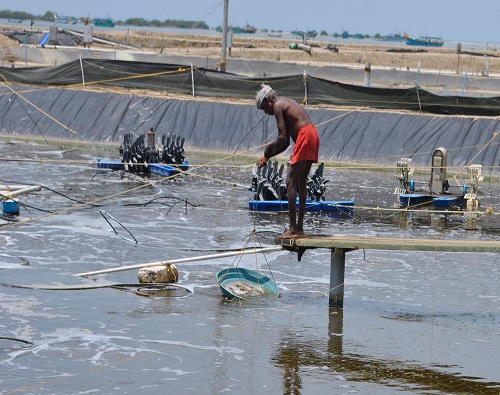Using technology to improve our aquaculture.
Did you know that the first ever aquaculture focused startup accelerator program- HATCH, was announced on 3rd April 2018 at the Seafood Innovation Cluster, Bergen Norway? Did you also know that an Indian aquaculture startup Aqua Connect was one of the eight companies from all over the world to be selected for this program? Rajamanohar K S, co-founder of Coastal Aquaculture Research Institute (CARI), and its brand Aqua Connect, spoke to me from Norway about becoming an accidental aquaculture entrepreneur and leveraging technology to improve conditions for Indian farmers.
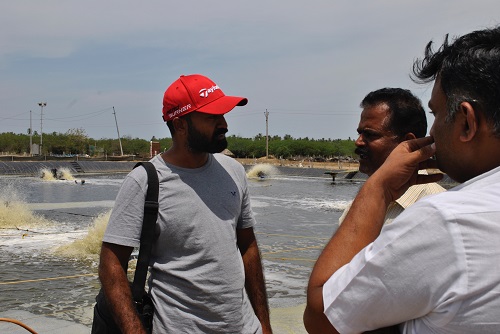
Image Courtesy: Aqua Connect
Journey to aquaculture entrepreneurship
For Rajamanohar entrepreneurship was not new, but the world of aquaculture sure was. “A year ago I would not have known much about shrimp farming and its intricacies. It was a serendipitous meeting with an old friend while travelling to my hometown, Chidambaram, which opened my eyes to aquaculture.” Rajamanohar met Sanjaikumar- a shrimp farmer and an old acquaintance. They got talking about the profession and Sanjai invited him over to his farm. “I visited Sanjai’s farm the next day. I got to understand that this is a lucrative business, but when things go awry, it sort of takes everything down with it. Shrimp farming is a gamble, just like agriculture, except it requires a bit more capital to run the show.”
The global shrimp industry is estimated at 30 billion dollars USD, and India’s share in this market is about 13 per cent. For an industry of this scale, what surprised Rajamanohar the most was a lack of standard operating procedures. “Intrigued by the shrimp industry, I started looking at the challenges farmers were facing on a regular basis. What I found was that they have to deal with many middlemen for the required inputs. This is very similar to the scenario in agriculture. Farmers are dependent on the middlemen for everything from larvae, to feed to finding the right market for their shrimps. Also, the transactions are not adequately documented, making the process even more difficult to follow. Harvest details worth crores are recorded in small bits of paper. In this industry, there are too many anomalies that define success or failure for the farmer.”
Team CARI decided to come up with an apt solution for these farmers, South Asia’s Largest Aqua Farmers Network- Aqua Connect.
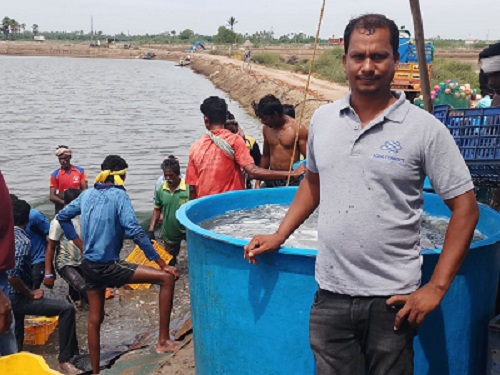
Aqua Connect
Along with Rajamanohar who has previously founded ventures like Kaasu, and Socialabs and takes care of the Technology & Business Strategy, team CARI consists of Sanjaikumar (Farm initiatives) and Shanmuga Sundara Raj (Insurance Industry veteran). The team was recently joined by Karthik Selvaraj who is a banker by profession.
“What we wanted to do was bring in the technological interface to make the whole process easy for farmers,” says Rajamanohar. Aqua Connect’s initiatives include Aqua Connect for hatcheries, for exporters and Aqua Locate. “We collect data from hatcheries, and we are able to provide farmers with information on where larvae are available. Traditionally this process included middlemen, plus farmers had to spend a lot of money to get to the hatcheries. Let’s not forget the time lost in all of this.” Rajamanohar shares that they initially worked on giving this information through an app, but they soon realised that farmers were not comfortable getting data through such an interface. “We set up call centres for them, instead. These centres operate in four different languages. Farmers can simply call and get the information they need. Plus, we also have some crowd-sourced feedback on the quality of the hatcheries.”
Using technology to address issues in our aquaculture ecosystem. Meet Aqua Connect. Click To TweetAqua Connect also works to provide affordable feed and other inputs for the process. “Feed contributes to 50% of the production cost. This gives feed providers a lot of control and power over the process. Most of the farmers in India are small and medium-sized aquafarmers- I can easily say above 90%. Processes need to be streamlined if we don’t want farmers to succumb to financial burdens. Through Aqua Connect we also distribute feed. For us, it works cheaper than the distributors because we work with a large number of customers and we order in bulk quantities. So we can pass on some of the benefits to the farmers.”
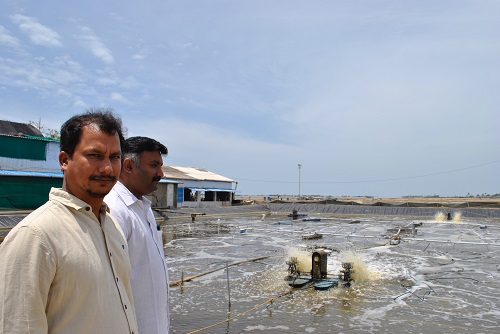
Rajamanohar adds that the team also analyzes market prices, and provides farmers with suitable quotations from exporters. “Our business model works such that we get a service fee from the stakeholders in this ecosystem -like hatcheries, feed manufacturers etc. Farmers are not shying away from paying. They are constantly on the lookout for consistent and quality service. This is what we are trying to give them at every step.”
There are about 3000 farmers enrolled in the Aqua Connect network, of which the team works with about 600 farmers from Andhra Pradesh and Tamil Nadu. Aqua Connect aims to reach out to 6000 farmers by the end of the year.
Let’s talk sustainability
Addressing sustainability is easier said than done, says Rajamanohar. Before we talk about sustainability, he emphasizes, we need to ensure farmers have infrastructural support. Rajamanohar adds that power infrastructure, cold chain supply chain and logistics need focus if we want to compete well in the global market. Talking about his experience at the HATCH program, he shares that it helps him understand the industry and its challenges from a global perspective. “It gives me insight on how the industry is being structured here, and how they are adding value to their products. This is something we lack in India. I can implement some of these learnings and see how it helps Indian farmers. We are also in talks with industry bodies in India, and we hope to get them introduced to the Norwegian Seafood Innovation Cluster. Since we interact a lot with aquafarmers, we can include their views in these discussions. I think it’s important that we build these networks and understand where the future of seafood is headed.”
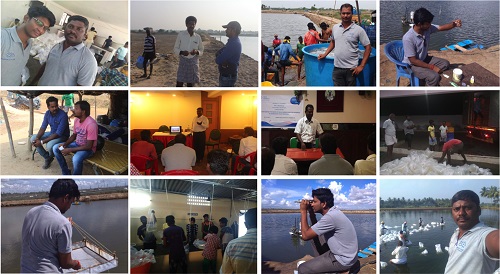
Talking about Aqua Connect, Rajamanohar shares that along with adding farmers from all over the country to their network, they hope to continue to work on technological products which will benefit farmers. CARI also provides training and educational support for them. But Rajamanohar says this is just the tip of the iceberg. “When we started this journey there was practically nothing of this nature supporting aquafarmers. Aqua Connect is slowly filling the gaps we found in their processes. Hopefully, more farmers will reap these benefits in the future. That is our goal.”
For more information visit http://www.cari.org.in/.
You may also like.
